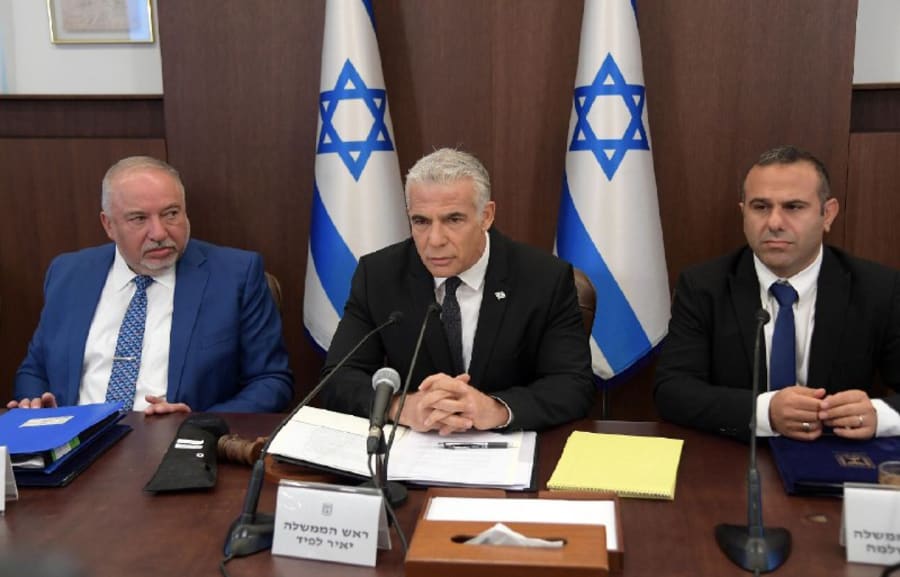Lapid to revive Israeli-PA economic summit after more than a decade
During Biden's visit to region last week, Israeli prime minister reiterated his support for a two-state solution and the need for closer dialogue between Israelis and Palestinians

Israeli Prime Minister Yair Lapid will revive the dormant Israeli-Palestinian economic summit, after it had been inactive for over a decade, I24NEWS reported Monday.
The last time this economic summit convened was in 2009. Bureaucracy and the reshuffling of responsibilities among Israeli governmental ministries reportedly resulted in the more-than-10-year hiatus. The summit was established to regulate the economic connections between Jerusalem and Ramallah, in accordance with the “Paris Protocol” of the Oslo Accords, signed in 1994.
Lapid reportedly instructed Israel’s Regional Cooperation Minister Issawi Frej to advance the reimplementation of the economic summit. Issawi told I24NEWS journalist Adam Habib that he will meet with the P.A.’s Minister of National Economy Khalid Al-Esseily “in the coming days” to decide on a specific date for the summit. It will likely be held within the next two months.
Lapid’s predecessor, alternate-Prime Minister Naftali Bennett, reportedly chose not to advance the economic summit with Ramallah. Bennett’s inaction likely was linked to his conservative voter base that is ideologically opposed to a “two-state solution.”
During his year as prime minister, Bennett refrained from talking directly with P.A. leader Mahmoud Abbas.
By contrast, the centrist-leader Lapid is a long-time advocate of the two-state solution and the need for closer dialogue between Jerusalem and Ramallah.
Ahead of U.S. President Joe Biden’s recent visit to the Middle East, Lapid spoke on the phone with Abbas. It was the first reported high-level conversation in five years between Abbas and an Israeli prime minister.
“The two spoke about the continuation of cooperation and the need to ensure quiet and calm,” stated the Israeli Prime Minister’s Office, following the conversation. Abbas also reportedly congratulated Lapid upon becoming the 14th prime minister of Israel.
Frej is expected to implement Lapid’s vision of reviving economic cooperation with the P.A. As an experienced Arab-Israeli politician, he reportedly is committed to improving relations between Arabs and Jews, both inside and outside Israel.
The idea of promoting Arab-Israeli peace through economic cooperation is not new.
Former Israeli Prime Minister Benjamin Netanyahu introduced a concept years ago that he labeled “economic peace,” a philosophy purporting that in the absence of a political solution to the conflict, bottom-up economic cooperation could pave the way toward genuine peace between Jerusalem and Ramallah.
Official relations between Israel and the P.A. are tense and few observers believe that a dramatic political breakthrough will happen any time soon.
In February, Israeli Defense Minister Benny Gantz became the first senior Israeli minister to meet Abbas in Ramallah. At the time, Gantz articulated a pragmatic approach to the daily interactions between the two sides.
“I told Abu Mazen [Abbas’ nom de guerre] that we aren’t going anywhere and that the Palestinians aren’t going anywhere. I went to the meeting in order to build confidence and preserve the interests of the State of Israel and the important ties we have with the Palestinian Authority, which I believe we need to strengthen,” the Israeli defense minister said.
The increased cooperation is also meant to prevent efforts by the Gaza-based terrorist organization Hamas to foment unrest and take over Judea-Samaria.

The All Israel News Staff is a team of journalists in Israel.













